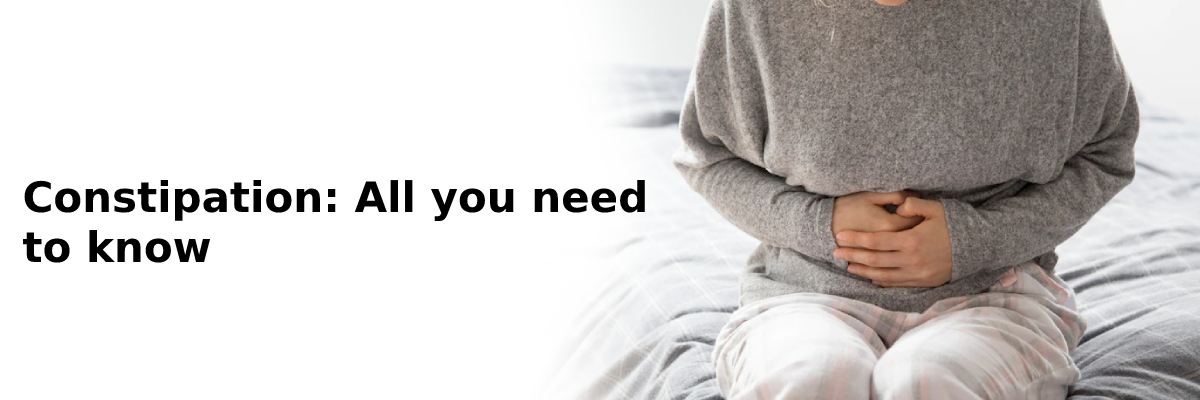
 IJCP Editorial Team
IJCP Editorial Team
Constipation: All you need to know
Constipation is a clinical condition manifested by infrequent bowel movements or difficulty passing stools that persists for several weeks or longer. It is one of the most common digestive problems, especially among older people, with women at a higher risk than men. Depending on the severity, constipation can cause abdominal pain or gas and may lead to chronic clinical conditions such as hemorrhoids (swollen anal veins), anal fissures (tears), and rectal prolapse (rectum stretches out protudes from anus).
A person suffering from constipation may exhibit the following signs and symptoms:
Few bowel movements – less than three per week
Difficulty in passing stool
Painful and strenuous bowel movement
Hard, dry or lumpy stools appearing like rocks and pebbles
Uneasiness and abdominal pain
A feeling of incomplete emptying and fullness
Bloating
If an individual experiences one or more of these symptoms, constipation may be considered chronic. The risk factors for chronic constipation include age, gender, quantity of water intake, eating habits, activity levels, and medications.
Causes of Constipation
Constipation has many possible causes ranging from poor diet to more severe disorders. The most common factors triggering constipation include:
Eating an unhealthy and low fiber diet
Less water intake and dehydration
Sedentary lifestyle
Certain medications and dietary supplements
Overuse or misuse of laxatives and other drugs
Clinical conditions like:
Blockages in the colon or rectum
Neurological problems with the nerves around the colon and rectum
Weak pelvic muscles or associated disorders
Hormonal fluctuations
Long-term conditions like diabetes
Hyperparathyroidism or hypothyroidism
Pregnancy
Gastrointestinal disorders like Irritable Bowel Syndrome
Mental conditions like stress or eating disorder
Need for Medical Interventions
It is advisable to visit a doctor in case of unexplained and significant changes in bowel habits. Healthcare experts recommend seeking medical advice if one experiences prolonged symptom associated with one or more of the following conditions:
Constipation that lasted for more than two weeks
Blood in the stool or rectal bleeding
Persistent and chronic pain in the abdomen
Severe pain during bowel movement
A drastic change in size, shape, and consistency of the stool
Unexplained weight loss
A sudden change in bowel movements
Vomiting
Fever
The healthcare professional may carry out certain tests to diagnose chronic clinical conditions, such as colorectal cancer or irritable bowel syndrome (IBS).
Diagnosis and Treatment
Most cases of constipation are mild and can be treated easily by dietary modifications, lifestyle changes, and exercise. However, chronic patients need proper diagnosis and suitable medical intervention as they may be indicative of underlying disease. The diagnostic procedure for constipation includes:
Analyzing the clinical and medicinal history
Assessing the symptoms and determining their severity
Conducting physical examination, including a rectal exam
Blood tests
Additional tests to identify the cause of the symptoms such as:
Colorectal Transit Study - to test how food is moving through the colon.
Anorectal Manometry - to evaluate anal muscle function.
Colonoscopy - for inspecting the colon internally
Barium Enema X-ray – for detailed examination of the colon and related internal structures.
The core treatment strategy to relieve constipation involves dietary modification and lifestyle measures. The general dietary recommendations to treat constipation include:
Drink 1.5 to 2 quarts of fluids every day.
Limit consumption of low-fiber food, alcohol, and caffeinated drinks.
Add fiber-rich foods to the diet, ensuring a daily intake of 20 and 35 grams.
In addition, lifestyle interventions like physical activity may help alleviate the symptoms. Doctors recommend carrying out at least 150 minutes of moderate exercise every week, aiming for 30 minutes daily at least five days per week. However, the physical activity level may vary depending on the age, gender, and clinical condition of the individual. Getting bowel training to ensure passing stool 15 to 45 minutes after breakfast each day is another successful strategy to relieve the symptoms of constipation. In cases where home remedies are not effective, an over-the-counter laxative may be administered under medical supervision. These may include:
Fiber supplements
Osmotic agents, such as polyethylene glycol solution, milk of magnesia, etc.
Stool softeners
Lubricants, such as mineral oil
Stimulants
For chronic constipation, the healthcare provider may introduce prescription drugs to treat the condition. Other treatment strategies generally employed for chronic constipation may include:
Biofeedback therapy to retrain the muscles
Enema to empty the abdomen
Manual removal of feces to provide relief
Surgery to remove any blockage
Tips for Prevention of Constipation
Eat a balanced diet and include plenty of high-fiber foods in each meal.
Reduce the intake of processed foods and dairy and meat products.
Drink plenty of fluids like lemon water, coconut water, etc.
Keep yourself hydrated by increasing your water intake.
Stay active and do regular exercise.
Manage your stress and stay happy
Don't ignore the urge to pass stool.
Create a regular schedule for bowel movements.
For bowel sensitivity, avoid high-fructose fruits as they can cause gas (apples, pears, and watermelon)
Take probiotic supplements, if necessary.

IJCP Editorial Team
Comprising seasoned professionals and experts from the medical field, the IJCP editorial team is dedicated to delivering timely and accurate content and thriving to provide attention-grabbing information for the readers. What sets them apart are their diverse expertise, spanning academia, research, and clinical practice, and their dedication to upholding the highest standards of quality and integrity. With a wealth of experience and a commitment to excellence, the IJCP editorial team strives to provide valuable perspectives, the latest trends, and in-depth analyses across various medical domains, all in a way that keeps you interested and engaged.













.jpg)







Please login to comment on this article